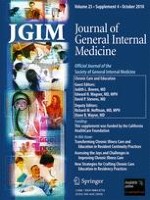Published in:

01-09-2010 | Original Research
A Multi-Institutional Quality Improvement Initiative to Transform Education for Chronic Illness Care in Resident Continuity Practices
Authors:
David P. Stevens, MD, Judith L. Bowen, MD, Julie K. Johnson, MSPH, PhD, Donna M. Woods, PhD, Lloyd P. Provost, MS, Halsted R. Holman, MD, Constance S. Sixta, PhD, Ed H. Wagner, MD
Published in:
Journal of General Internal Medicine
|
Special Issue 4/2010
Login to get access
Abstract
BACKGROUND
There is a gap between the need for patient-centered, evidence-based primary care for the large burden of chronic illness in the US, and the training of resident physicians to provide that care.
OBJECTIVE
To improve training for residents who provide chronic illness care in teaching practice settings.
DESIGN
US teaching hospitals were invited to participate in one of two 18-month Breakthrough Series Collaboratives—either a national Collaborative, or a subsequent California Collaborative—to implement the Chronic Care Model (CCM) and related curriculum changes in resident practices. Most practices focused on patients with diabetes mellitus. Educational redesign strategies with related performance measures were developed for curricular innovations anchored in the CCM. In addition, three clinical measures—HbA1c <7%, LDL <100 mg/dL, and blood pressure ≤130/80—and three process measures—retinal and foot examinations, and patient self-management goals—were tracked.
PARTICIPANTS
Fifty-seven teams from 37 self-selected teaching hospitals committed to implement the CCM in resident continuity practices; 41 teams focusing on diabetes improvement participated over the entire duration of one of the Collaboratives.
INTERVENTIONS
Teaching-practice teams—faculty, residents and staff—participated in Collaboratives by attending monthly calls and regular 2-day face-to-face meetings with the other teams. The national Collaborative faculty led calls and meetings. Each team used rapid cycle quality improvement (PDSA cycles) to implement the CCM and curricular changes. Teams reported education and clinical performance measures monthly.
RESULTS
Practices underwent extensive redesign to establish CCM elements. Education measures tracked substantial development of CCM-related learning. The clinical and process measures improved, however inconsistently, during the Collaboratives.
CONCLUSIONS
These initiatives suggest that systematic practice redesign for implementing the CCM along with linked educational approaches are achievable in resident continuity practices. Improvement of clinical outcomes in such practices is daunting but achievable.





